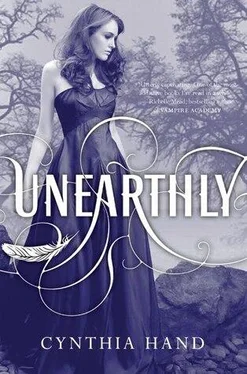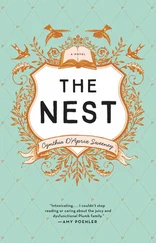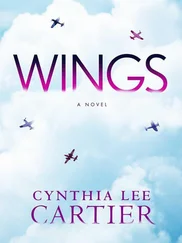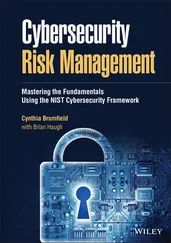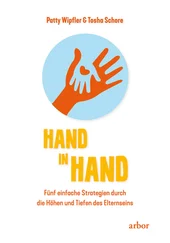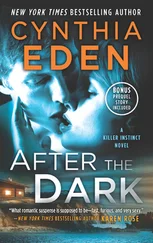Then comes the angel diary, which I started when I was fourteen. This one’s a midnight blue spiral-bound notebook with a picture of an angel on it, a serene, feminine angel who looks eerily like Mom, with red hair and golden wings, standing on the sliver of the crescent moon surrounded by stars, beams of light radiating from her head. In it I jotted down everything Mom ever told me about angels and angel-bloods, every fact or piece of speculation I could coax out of her. I also recorded my experiments, like the time I cut my forearm with a knife just to see if I would bleed (which I did, a lot ) and carefully noted how long it took to heal (about twenty-four hours, from when I made the cut to when the little pink line completely disappeared), the time I spoke Swahili to a man in the San Francisco airport (imagine the surprise for both of us), or how I could do twenty-five grands jetés back and forth across the floor of the ballet studio without getting winded. That was when my mom started seriously lecturing me about keeping it cool, at least in public. That’s when I started to find myself, not just Clara the girl, but Clara the angel-blood, Clara the supernatural.
Now my journal (simple, black, moleskin) focuses entirely on my purpose: sketches, notes, and the details of the vision, especially when they involve the mysterious boy.
He constantly lingers at the edges of my mind — except for those disorienting moments when he moves blindingly to center stage.
I grow to know him through his shape in my mind’s eye. I know the sweep of his broad shoulders, his carefully disheveled hair, which is a dark, warm brown, long enough to cover his ears and brush against his collar in the back. He keeps his hands tucked into the pockets of his black jacket, which is kind of fuzzy, I notice, maybe fleece. His weight is always shifted slightly to one side, as if he’s getting ready to walk away. He looks lean, but strong. When he begins to turn I can see the faintest outline of his cheek, and it never fails to make my heart beat faster and my breath hitch in my throat.
What will he think of me? I wonder.
I want to be awe-inspiring. When I appear to him in the forest, when he finally turns and sees me standing there, I want to at least look the part of an angel. I want to be all glowy and floaty like my mom. I’m not bad looking, I know. All angel-bloods are a fairly attractive bunch. I have good skin and my lips are naturally rosy so I never wear anything but gloss. I have very attractive knees, or so I’m told. But I’m too tall and too skinny, and not in the willowy supermodel sort of way but in a storklike, all-arms-and-legs sort of way. And my eyes, which come across as storm-cloud gray in some lights and gunmetal blue in others, seem a bit too big for my face.
My hair is my best feature, long and wavy, bright gold with a hint of red, trailing behind me wherever I go like an afterthought. The problem with my hair is that it’s also completely unruly. It tangles. It catches in things: zippers, car doors, food. Tying it back or braiding it never works. It’s like a living thing trying to break free. Within moments of wrestling it down, there are strands in my face, and within the span of an hour it usually slides out of its confines completely. It takes the word “unmanageable”
to a whole new level.
So with my luck, I’ll never make it in time to save the boy in the forest because my hair will have snagged on a tree branch a mile back.
* * *
“Clara, your phone’s ringing!” Mom hollers from the kitchen. I jump, startled. My journal lays open on my desk in front of me. On the page is a careful sketch of the back of the boy’s head, his neck, his tousled hair, the hint of cheek and eyelashes. I don’t remember drawing it.
“Okay!” I yell back. I close the journal and slide it under my algebra textbook. Then I run downstairs. It smells like a bakery. Tomorrow’s Thanksgiving, and Mom’s been making pies. She’s wearing her fifties housewife apron (which she’s had since the fifties, although she wasn’t a housewife back then, she assures us) and it’s dusted with flour. She holds the phone out to me.
“It’s your dad.”
I raise an eyebrow at her in a silent question.
“I don’t know,” she says. She hands me the phone, then turns and discreetly exits the room.
“Hi, Dad,” I say into the phone.
“Hi.”
There’s a pause. Three words into our conversation and he’s already out of things to say.
“So what’s the occasion?”
For a moment he doesn’t say anything. I sigh. For years I used to practice this speech about how mad I was at him for leaving Mom. I was three years old when they split. I don’t remember them fighting. All I retained from the time they were together are a few brief flashes. A birthday party. An afternoon at a beach. Him standing at the sink shaving. And then there’s the brutal memory of the day he left, me standing with Mom in the driveway, her holding Jeffrey on her hip and crying brokenheartedly as he drove away. I can’t forgive him for that. I can’t forgive him for a lot of things. For moving clear across the country to get away from us. For not calling enough. For never knowing what to say when he does call. But most of all I can’t get past the way Mom’s face pinches up whenever she hears his name.
Mom won’t discuss what happened between them any more than she’ll dish about her purpose. But here’s what I do know: my mother is as close to being the perfect woman as this world is likely to see. She’s half angel , after all, even though my dad doesn’t know that. She’s beautiful. She’s smart and funny. She is magic. And he gave her up. He gave us all up.
And that, in my book, makes him a fool.
“I just wanted to know if you’re okay,” he says finally.
“Why wouldn’t I be okay?”
He coughs.
“I mean, it’s rough being a teenager, right? High school. Boys.”
Now this conversation has gone from unusual to downright strange.
“Right,” I say. “Yeah, it’s rough.”
“Your mom says your grades are good.”
“You talked to Mom?”
Another silence.
“How’s life in the Big Apple?” I ask, to steer the conversation away from myself.
“The usual. Bright lights. Big city. I saw Derek Jeter in Central Park yesterday. It’s a terrible life.”
He can be charming, too. I always want to be mad at him, to tell him that he shouldn’t bother trying to bond with me, but I can never keep it up. The last time I saw him was two years ago, the summer I turned fourteen. I’d been practicing my “I-hate-you” speech big-time in the airport, on the plane, out of the gate, in the terminal.
And then I saw him waiting for me by the baggage claim, and I filled up with this bizarre happiness. I launched myself into his arms and told him I’d missed him.
“I was thinking,” he says now. “Maybe you and Jeffrey could come to New York for the holidays.”
I almost laugh at his timing.
“I’d like to,” I say, “but I kind of have something important going on right now.”
Like locating a forest fire. Which is my one reason for being on this Earth. Which I will never be able to explain to him in a thousand years.
He doesn’t say anything.
“Sorry,” I say, and I shock myself by actually meaning it. “I’ll let you know if things change.”
“Your mom also told me you passed Driver’s Ed.” He’s clearly trying to change the subject.
“Yes, I took the test and parallel parked and everything. I’m sixteen. I’m legal now.
Only Mom won’t let me take the car.”
“Maybe it’s time we see about getting you a car of your own.”
My mouth drops open. He’s just full of surprises.
Читать дальше
